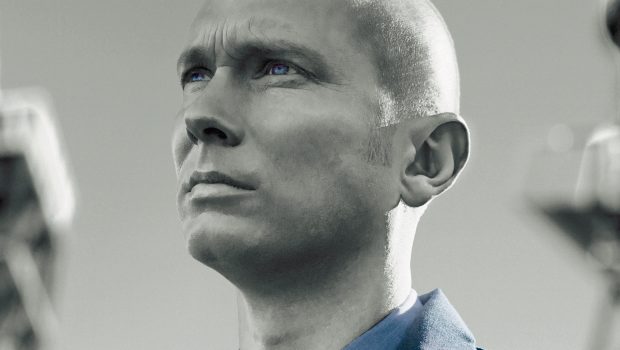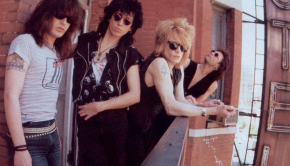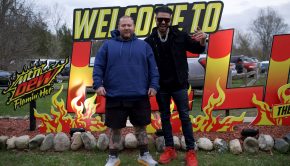Nigel Stanford On “Automatica,” Making Smart Viral Videos & Appreciating All Sorts Of Music
A New Zealand-based techie and musician, Nigel Stanford made a major impact with the music video for his song “Cymatics.” Stanford quickly gained over 60 million views for “Cymatics,” 45 million of those streams via Facebook. Long before his success with “Cymatics,” NASA and the European Space Agency both used music from Stanford’s first album, 1999’s Deep Space. In 2008, Stanford co-produced the film Second Hand Wedding, which became a number one box office hit and the seventh highest-grossing New Zealand movie ever. In 2012, Stanford produced and wrote the soundtrack for the documentary TimeScapes, as done in collaboration with famed photographer Tom Lowe.
“Automatica” is the title track from Nigel Stanford‘s latest album, as released back in September. While in New York to promote Automatica, I spoke with Stanford in-person at the office of Sony Music Masterworks. More on Stanford and Automatica can be found online at www.nigelstanford.com.
When you have such ambitious music videos, do you ever worry that people may think of the music as secondary?
Nigel Stanford: Sure… More people discover me through that than, you know, Spotify algorithms, radio stations, things like that. It is fine. For me the music is the important part. I really enjoy the visual stuff as well. Making videos is fun and if that is something that gives me some attention, it’s all good, I can’t complain about it.
When you have a concept like robots being programmed to play the instruments besides you, do you know like, “oh this is the song for that?” Do you have to write specifically?
Nigel Stanford: Yes… I would do the different science experiments and figure out what shapes could be made with different tones. “Okay, this is my palate I’ve got this one sound, I am going to write a tune with that,” then the robots were kind of similar. I knew I wanted them to play drums and I wanted them to sort of look kind of like a person playing drums with two arms… I was pretty sure I could get it to play a keyboard of some kind, so I got the robots and that was sort of three weeks doing some experiments and figuring out what they could do. Then I kind of wrote the music for it before we shot it, sort of after I’d played with the robots for a while to see what they could do.
With all that needed, do you feel pressure that your next video like has to be of a certain artistic level or certain amount of originality? Do you feel that kind of pressure?
Nigel Stanford: Yeah, absolutely. I mean, I have a video that’s going to come out a couple weeks and it’s a little different. It’s not robots or science or anything like that, I basically made a kind of sci-fi story. So we’ll see how that goes, but I have other plans for other videos… I don’t so much feel pressure, because I’m pretty sure I have a couple of good ideas I haven’t done yet. After seeing that people do respond to them, I’m sort of not so worried that you know something’s going to flop.
Does the world of music videos lead to wanting to do commercials or feature films?
Nigel Stanford: I was involved in feature films, I’ve produced three movies… I’ve done a lot of stuff back in my time… I was doing music my whole life and I took a break and I got involved in movies for a while there. I enjoyed it but I sort of had ambitions at one point of directing something or writing something. After being involved in a couple, I realized how much work that is, and it’s like two or three years for a project and hundreds of people involved and all that… I hadn’t spent my entire 20s learning how to be a film director, so I felt I’m going to stick with what I’ve been doing and what I’m good at. I kind of came back to music, but the videos have kind of allowed me to sort of indulge part of myself and come up with ideas and go out on the shoot.
I sort of do that for a while and then after six months of that, I’m kind of like, “I really want to get back to do the music now.” Then after a year or two of doing the music, I am like. “I really want to make a video now.” It’s good to have some variety.
As a musician, a director, a scientist — or at least a specialist in robotics — do you have a way of describing what it is that you do for a living?
Nigel Stanford: I describe myself as a musician, and just to be clear I didn’t direct those two videos either, it was sort of a collaboration with my buddy Shahir Daud, who lives in New York and is a great director. I say I am a musician and if they ask questions about that, I get into it a bit more. When you say you are a musician, they don’t expect that to be your actual career in terms of income, so it’s quite rare. So they are like, “What else do you do?”
I refer to you as a director because you came up with the concept and oftentimes the directors who comes up with the concept and writes it. When you come up with a concept, is it then a process being able to find somebody who can realize it?
Nigel Stanford: Yeah, I think the main sort of thing with working with Shahir is just having a collaborator. Having someone you can bounce ideas off and go, “hey, what if the robot had a laser almost trying to kill you, and then you had to run and had that red button on the wall and everything stops?” It’s like, “let’s not do that idea, let us do another idea,” or it’s great to have someone sort of on your same wavelength and you like the same kind of films and kind of stuff. He’s quite good because he’s really into music. He listens to a lot of bands, he works with MTV and he’s constantly saying, “hey, why don’t you do something a bit cooler?” He’s always introducing me to new bands and new things.
Speaking of your musician past, was there a particular artist or album that got you started?
Nigel Stanford: If I tell you the truth I am going to really date myself. When I grew up, sort of the hair-metal phase was going on, and I really dug Bon Jovi and Guns N’ Roses and those kinds of bands, so I picked up a guitar and grew my hair along and I started playing that kind of thing. Then in the 90s the dance music thing really hit big in New Zealand and England, not so much in America till later. But this sort of house music and four-on-the-floor and that kind of thing, and I really got into that and Massive Attack and bands like that. Then I sort of realized that it was easier than trying to put a band together with a drummer and a singer. That’s all very hard because you’ve got to find five talented people who’ve got equipment, and time and they all got the same kind of passion, which is a little harder in a small town like Wellington. So I started doing dance music because it was just kind of, I can do the whole thing myself, and I carried on doing it.
I find that the hobbies that people have in their childhood usually somewhere in their 30s comes full circle. You realize that you love that stuff again. Did it ever go that way with hair metal, or you are totally through with that?
Nigel Stanford: I still really like a wide variety of music, like I really like pop music. I can totally appreciate a Justin Bieber song, I like DJ Snake and I can totally appreciate Metallica and Tool… I pretty much do like everything, so for my latest album I sort of started collaborating with singers and so I ended up with sort of three or four singers on the album and one track with a rapper. I can do a lot of different things.
I really like all those different genres, I wonder if that sort of freaks my fanbase out when I kind of branch out and do something kind of radically different to previous work. But you know, I like all that stuff. I’ve done a soundtrack album for a movie, so I am really into that as well, and I just think all those influences are good to combine. You kind of end up with your own sort of sound, it’s a kind of sum of all the things you have liked in your life.






























